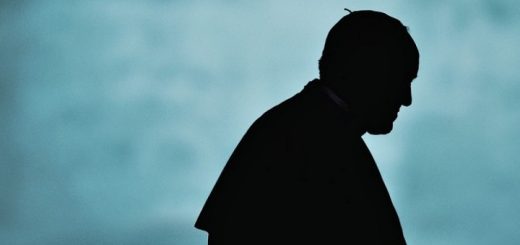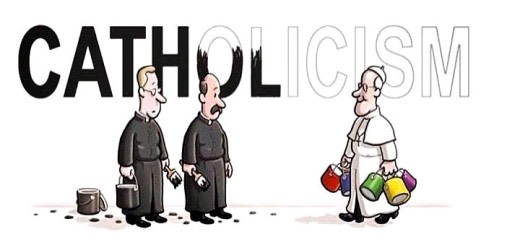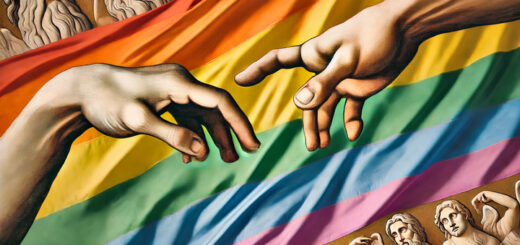The Francis effect is making its way into the debate on the Church and LGBT people
Reflections by Marianne Duddy-Burke published on the Huffington Post (United States) on 22 July 2016, freely translated by Silvia Lanzi
Much has been written about how the “Francis effect” could push the Catholic Church down the path of inclusion or at least acceptance of LGBT people. The most cited statements are the question “Chi sono io per giudicare?” (July 2013) and his most recent commentary on how the Church should “ask for forgiveness from the gay people he offended” (June 26, 2016). However, I believe the most promising message for LGBTQ people (and others alienated from Catholic teaching and practice) can be found in another provocative statement by Francis and the fallout a year and a half later.
In a December 2014 interview with the Argentine newspaper The Nation Francis addressed the topic of the different opinions existing among ecclesiastics. Speaking about the first phase of the Synod on the Family, the Pope said: “The resistance is now evident. And it's a good sign to me that it comes out, without furtive muttering, if there is disagreement. It's healthy to bring these things out into the open, very healthy!”. Francis continued by saying that it is natural that there are discussions of this type in the Church: “Resistance means different points of view, that's not a bad thing. It has to do with some of the positions I take sometimes, I grant… But I'm not worried. It seems to me that this is normal. It wouldn't be normal if there weren't different opinions."
The acceptance, and even encouragement, of divergent expressions represents a turning point "important" for a pontiff, especially after John Paul II and Benedict XVI. During these pontificates, anyone who questioned the official teachings or opinions of the Pope would face very harsh sanctions. Even national bishops' conferences discourage dissent, so for decades there has been virtually a great deal of uniformity on many topics and certainly no help regarding the inclusion of LGBTQ people, the recognition of same-sex relationships, or closeness to those who identify with a gender different from that of birth.
In recent times some Catholic bishops have intervened to demonstrate that great divergence of opinion exists among the leaders of the Church on these topics, and not only on these. Although the two phases of the Synod on the Family did not lead to significant changes in policy and pastoral care for LGBTQ people, intermediate documents were nevertheless drawn up, especially in the first phase of the Synod, which clearly indicate that some of the participants were pushing for a position more positive on these issues. Although this language did not survive in the Synod's final report, the interim document states that “homosexuals have gifts and qualities to offer the Christian community” is “without denying the moral problems connected to homosexual unions, we must note that there are cases in which mutual help to the point of sacrifice constitutes precious help in the lives of the partners”. Here it is clear that at the Synod the voice of a group of supporters of LGBTQ people who wants a change in the Church's point of view was made heard.
In December 2015 the Belgian bishop Johan Bonny suggested that the Church should give a “formal recognition” to homosexual relationships in which “exclusivity, loyalty and mutual care are central”. In the United States, the gay massacre at the Pulse in Orlando brought to the fore the differences of opinion of Catholic prelates. The U.S. Conference of Catholic Bishops, as well as many diocesan statements, spoke of violence, guns and terrorism, but most refused to acknowledge that the target was the LGBTQ community. However, a handful of dioceses offered their condolences in their statements. St. Petersburg Bishop Robert Lynch went even further by stating that “It is religion, including ours, that targets them, most often verbally, and fuels contempt towards gays, lesbians and transsexuals, and this is sad. Today's attack on LGBT men and women has planted the seed of contempt and hatred, which can ultimately lead to violence.". This statement, welcomed by LGBT people and many others, led to an immediate rebuke from the Archbishop of Miami (and Metropolitan of Lynch) who said that Bishop Lynch “should have known better the truth of the random consequences of this lone wolf's terrorist attack.”
In early July, Archbishop Chaput of Philadelphia announced that anyone with a same-sex partner would be denied communion; not only that, they would not have been able to be part of the pastoral council, nor read the readings during mass. In the same week, the bishop of San Diego Robert McElroy participated in a commemoration for the Orlando victims organized by the LGBT community and Latino groups. After nearly thirty years in which adherence to the official teachings of the Church seemed almost monolithic among Catholic bishops, this declared difference of opinion is indeed a sign of hope. Now we can realize that, just as there is diversity of opinion among lay people regarding LGBTQ people, the same occurs among those responsible for the development and leadership of the ecclesiastical reality.
While the desire to review current teaching and practice concerns a minority of Church leaders, their voices have been heard and it is likely that many will be added in the coming months. This could help shift the focus from Pope Francis' statements to the recognition that there is a community of leaders responsible for the Church's teaching and policy. As more and more Catholics, at the top and at the grassroots, commit themselves to the civil and ecclesial rights of LGBTQ people and their families, the political and cultural identity firmly opposed to gay and transgender rights will quickly collapse, despite feeble attempts to maintain oppressive structures. Francis' encouragement of honest dialogue about differing opinions may have a greater impact on the LGBTQ community, public policy and global culture than anything he has said or done so far. This could be an unexpected but much appreciated effect of the “Francis effect”.
* Marianne Duddy-Burke is executive director of DignityUSA, a Catholic organization that works for LGBTQ equality.
Original text: How an Unexpected Aspect of “The Francis Effect” May Further LGBTQ Equality






